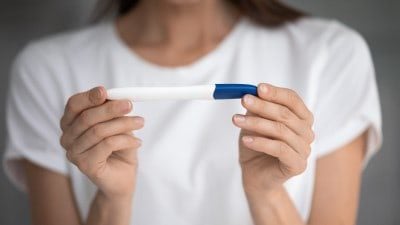Maybe you’ve heard your fertility team mention “hCG” more than a few times. Or perhaps you’ve come across it in your own research. hCG, also known as human chorionic gonadotropin, is the hormone detected via your pregnancy test after a successful fresh or frozen IVF cycle.
So, what does this hormone do in the body? What should you know about it in relation to IVF? We’re going to cover all of this in the sections below.
What is hCG?
hCG, also called human chorionic gonadotropin, is a hormone produced by the cells around the embryo, which actually go onto develop the placenta. Generally, hCG maintains progesterone levels during the beginning of pregnancy, which supports healthy uterine and fetal growth.
Initially, hCG levels are quite high. Yet, they tend to decrease after the three month mark. In fact, during the first four weeks, hCG levels double every 48 to 72 hours. This acceleration of hCG levels then slows around week six, reaching its peak levels at about 8 to 11 weeks. Overall, hCG is a very important hormone during the first trimester of pregnancy, ensuring the health of the embryo until the placenta is formed.
Pregnancy Testing After IVF
A pregnancy test after IVF will assess your hCG levels, since this is the only time the body produces this hormone.
Two Week Wait After IVF
The two week wait refers to the time period between when an embryo implants versus when detectable levels of hCG are present. During this time, your fertility team may recommend that you eat and do other things as if you were pregnant to encourage implantation and growth of the embryo.
These two weeks are also very important since during a fresh embryo transfer hCG trigger shots are administered during the stimulation phase to help encourage the maturation of as many eggs as possible. If you don’t wait two weeks, you might get a false positive during your pregnancy test. At the same time, this is different for a frozen embryo transfer, which is discussed in more detail in the following two sections.
Fresh Embryo Transfer
hCG trigger shots encourage egg maturation but they also last about 5 to 14 days within the body. This means that time is important to give your body a chance to break down and eliminate the hCG that would have been present in these shots. Doing so can ensure you don’t face a false positive, which down the line can cause a lot of grief and stress.
Frozen Embryo Transfer
During a frozen embryo transfer, trigger shots are not administered so false positives aren’t as big of an issue. However, the two week wait is still encouraged to ensure accurate results, especially since hCG isn’t produced at detectable levels for the first 10 days of pregnancy.
Beta hCG Test
Pregnancy testing after IVF usually involves the beta hCG test. This test measures your hCG levels in your blood. Additionally, this test may be used for evaluating fertility options or assessing how things are going during pregnancy. During this test, hCG levels are measured in milli-international units per milliliter (mIU/ml).
What are Normal hCG Levels?
hCG levels depend on various factors, including fresh versus frozen embryo transfer, day 3 versus day 5 transfers, when the test is performed, and more. Generally, hCG levels under 5 mIU/ml will produce a negative pregnancy test. hCG levels over 25 mIU/ml will produce a positive pregnancy test.
Additionally, the rate of increase of hCG is more important during pregnancy than the absolute hCG number. In fact, hCG levels are something that doctors and fertility teams tend to test at least a few times to determine how your pregnancy is going. A typical rate of increase after the first beta hCG is observing a doubling of the levels two days after the first test (e.g. 25 mIU/ml in the first blood draw, and two days later 50 mIU/ml).
How Do hCG Levels Differ Between Fresh and Frozen Embryo Transfers?
Usually, fresh embryo transfers have a faster rate of rising hCG levels than frozen embryo transfers. However, fresh embryo transfers may involve elevated levels of hCG due to the trigger shots used during the stimulation phase. This can, sometimes, throw off a pregnancy test. On the other hand, a frozen embryo transfer doesn’t involve these trigger shots, which means elevated hCG levels are often a good indicator that pregnancy is occurring.
What Do High hCG Levels Mean?
High hCG levels may simply mean that you are further along in your pregnancy than initially thought. However, they can also indicate a multiple pregnancy or a higher chance that your child will have Down Syndrome. Keep in mind that high or low hCG levels will be monitored by your fertility team to determine exactly what is happening.
What Do Low hCG Levels Mean?
Like high hCG levels, low hCG levels may indicate a variety of things, and thus, it’s important to not jump to conclusions too quickly. Usually, if hCG levels are high or low, your team will check back in 48 to 72 hours to get a better idea as to what is going on. Low hCG levels may suggest that you aren’t as far along in your pregnancy as initially thought, a miscarriage, or an ectopic pregnancy.
hCG Increase Rate
When it comes to hCG, the most important part is the hCG increase rate as opposed to the absolute number involved in hCG levels. This is why low or high hCG levels are monitored — your fertility team is checking the acceleration rate.
Slow Rising hCG
If your hCG levels are rising but not doubling, your fertility team may become concerned about risks of miscarrying or other risks with pregnancy. At the same time, this can happen during completely normal pregnancies. If other factors seem normal, your team or doctor will likely simply monitor your hCG level chart or your hCG levels by the week to determine if anything changes or to observe if things speed up.
hCG Levels Going Down
hCG levels naturally go down after the first trimester. In other cases, hCG levels may go down during the first trimester then gradually go back up. While this isn’t normal, it is possible. If hCG levels continue to go down over the first trimester, however, it may indicate a miscarriage is about to happen. Yet, it is important to keep in mind that decreasing hCG levels aren’t a definite sign that a miscarriage is taking place.
At ELITE IVF, our compassionate and experienced team is ready to help you achieve your baby dreams. We are with you every step of the way. Contact us today to learn more.


